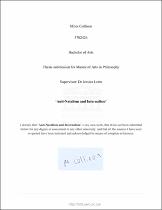| dc.description.abstract | Is it morally permissible to bring children into existence? We often go our whole lives never
asking ourselves this question, since procreation and parenthood are societal norms. However, a
local (and controversial) philosopher, David Benatar, thinks there are strong philosophical
reasons to abstain from procreation. In his book, Better Never to Have Been, he presents the
argument that bringing children into existence is morally impermissible on account that coming
into existence is always a harm. This argument has been met with much criticism and scrutiny,
thus producing a great deal of contemporary literature. One more recent critic is Nicholas
Smyth. His claim, as opposed to the many others who have focused on the small details of
Benatar’s work, is more deeply fundamental; Smyth claims that Benatar, as well as the
procreation ethicists who have gone on to discuss his work, are not doing ethics at all. | en_US |

